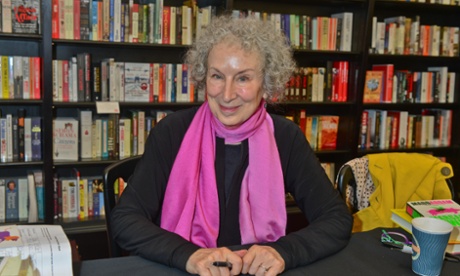
Margaret Atwood has had a busy year. Not only did she celebrate her 75th birthday earlier this month, she also announced her participation in the Future Library project, where she will submit a completed work of fiction to be locked away for 100 years in a time capsule. Yesterday she took part in a Reddit AMA, where she covered subjects such as the inspiration for The Handmaid’s Tale, and her thoughts on religion.
1) Even though she was named Humanist of the Year in the 1980s, she doesn’t identify as one:
“I describe myself as a rigorous agnostic, which means that you cannot declare as a matter of material truth something that is in fact a matter of spiritual belief. I am nervous about dogmas of any kind, whether they be religious, political, or anti-religious. Too many heads have rolled because of them.”
2) Some of the inspiration for The Handmaid’s Tale came from her own ancestors:
While she listed a number of inspirations, Atwood noted her special interest in the 17th century history of New England. “Some of those Quaker-hanging, witch-hunting Puritans were my ancestors, so I’ve always been fascinated by them.”
3) The epilogue of The Handmaid’s Tale isn’t as hopeful as some readers believe:
“Just as at the end of 1984 there is an article on Newspeak written in standard English and in the past tense, so 1984 did not last. And Gilead did not last, which is a hopeful thing. However, people are evaluating that past in ways that we might find frivolous and wrongheaded, and they are using it for their own purposes. Which happens all the time... how DO we understand the past? What ARE its uses? Do we ever learn from it, or do we learn enough, or do we sometimes learn the wrong things?”
4) She doesn’t know what happens to her characters after the end of the book:
Unless it’s “signalled,” Atwood is never quite sure what happens to her characters after the final page. There are exceptions however: “I sometimes have a strong desire to find out (hence, The Year of the Flood and MaddAddam), but I hardly ever follow that desire unless there’s a truly open space at the end of the book.”
5) She ran a comic strip in the 1970s:
In fact, Atwood believed that she would be a painter instead of a writer at first. “I had a serigraph poster business in college,” she noted, also highlighting that she designed some of the books covers for her poetry. She was also “once quite a good knitter.”
6) ComicCon played an inspirational role for the direction of her latest short story collection:
As she worked on stories for Stone Mattress, she began to move away from social realism stories more to tales, “though sometimes the tales were imbedded in the realism.” When she attended ComicCon, it opened up a “whole new world that seemed worthy of a fictional exploration.”
7) Unsurprisingly, she always has a stack of books she’s reading:
Currently, she is re-reading Alice Munro’s Lives of Girls and Women, since she is writing an essay on it for a collection on Munro’s work. She’s also reading Russian writer Ludmilla Petrushevskaya’s The Woman Who Loved Her Children Until They Moved Back Home, a collection of three stories.
8) For Atwood, writing is a bit like swimming in a cold lake:
Atwood sees the connection between putting pen to paper and going for a dip. “Being Canadian, I go swimming in icy cold lakes, and there is always that dithering moment. Am I really going to do this? Won’t it hurt? And at some point you just have to flop in there and scream. Once you’re in, keep going. You may have to crumple and toss, but we all do that. Courage! I think that is what’s most required.”
9) She would need about two weeks to consider which literary character she would date long-term.
“Some fine upstanding young man, pure in thought and deed, like Daniel Deronda, or a sexy scamp like Rhett Butler? Maybe a good conversationalist, at my age? I fancy Sherlock Holmes, but he doesn’t date much, and anyway the date would be interrupted because he would have to rush off in the middle of it to trap some criminal.”

